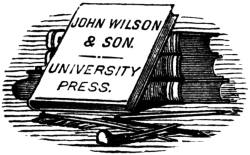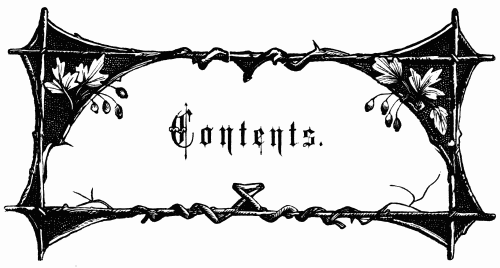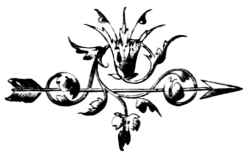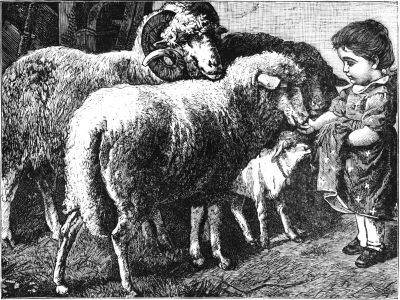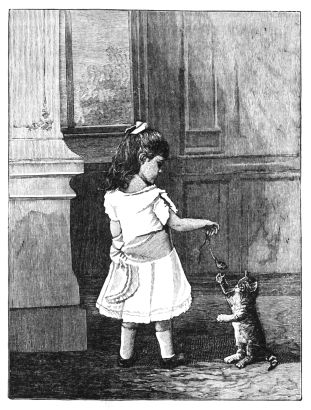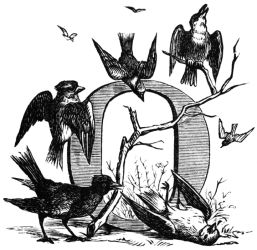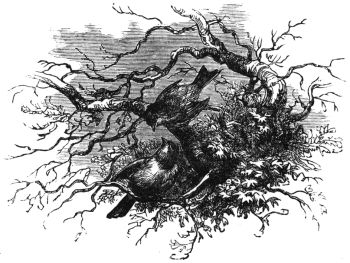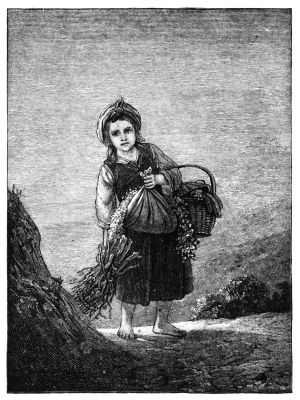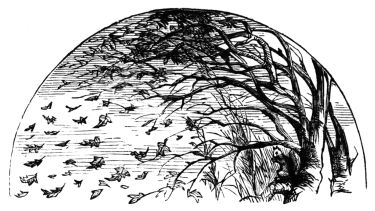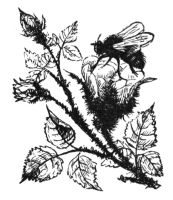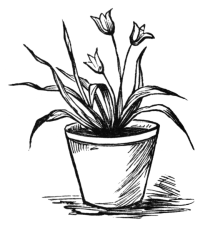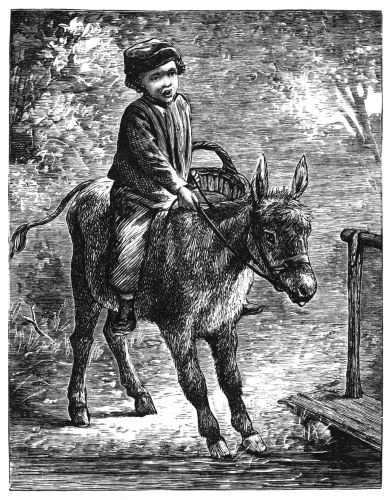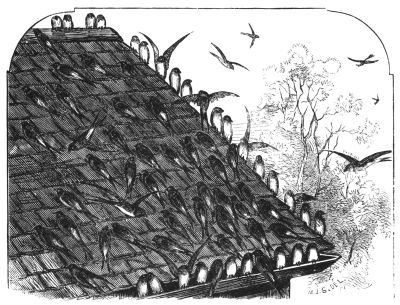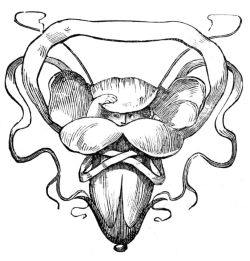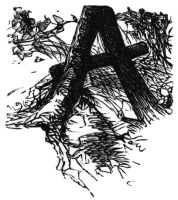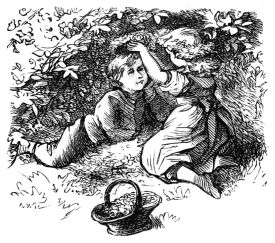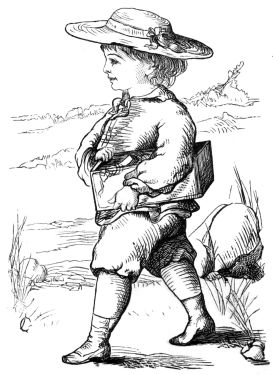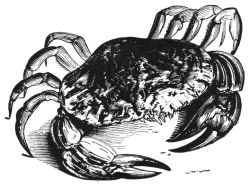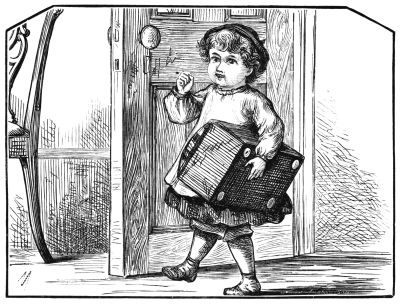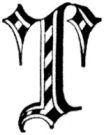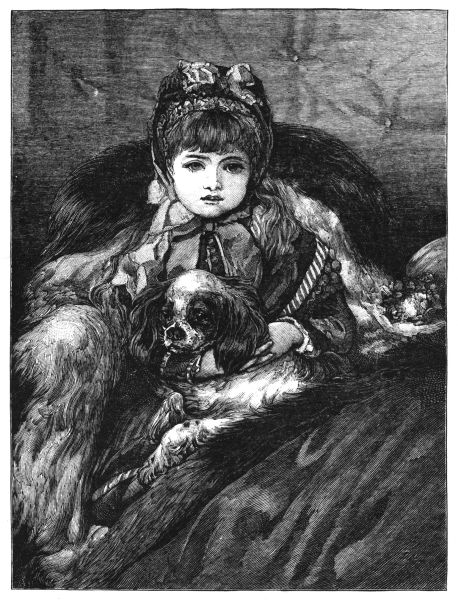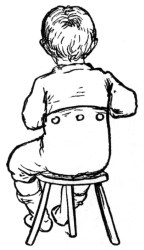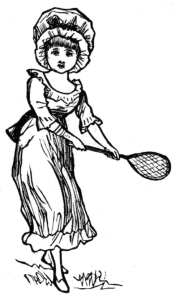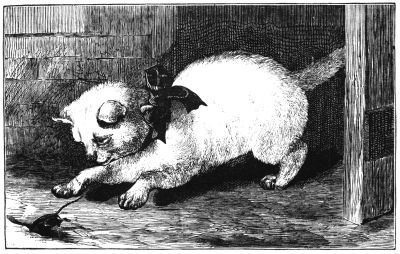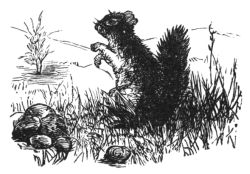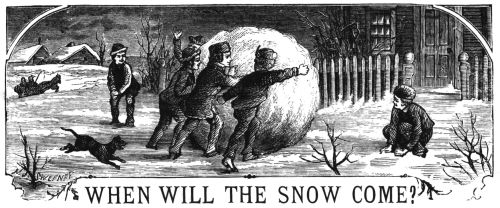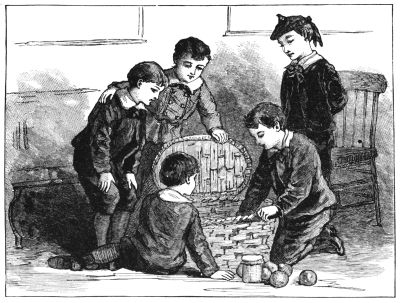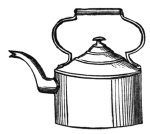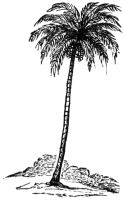Project Gutenberg's The Nursery, November 1881, Vol. XXX, by Various
This eBook is for the use of anyone anywhere at no cost and with
almost no restrictions whatsoever. You may copy it, give it away or
re-use it under the terms of the Project Gutenberg License included
with this eBook or online at www.gutenberg.org
Title: The Nursery, November 1881, Vol. XXX
A Monthly Magazine for Youngest Readers
Author: Various
Release Date: February 22, 2013 [EBook #42160]
Language: English
Character set encoding: UTF-8
*** START OF THIS PROJECT GUTENBERG EBOOK THE NURSERY, NOVEMBER 1881 ***
Produced by Emmy, Juliet Sutherland and the Online
Distributed Proofreading Team at http://www.pgdp.net Music
transcribed by Veronika Redfern.
[i]
THE
NURSERY
A Monthly Magazine
For Youngest Readers.
VOLUME XXX.—No. 5.
BOSTON:
THE NURSERY PUBLISHING COMPANY,
No. 36 Bromfield Street.
1881.
[ii]
Entered according to act of Congress, in the year 1881, by
THE NURSERY PUBLISHING COMPANY,
In the Office of the Librarian of Congress at Washington.
[iii]
IN PROSE. |
| |
PAGE |
| Where Jimmy Lives |
323 |
| Jessie and her Kitten |
324 |
| Fanchette |
329 |
| Old Jack |
333 |
| A Day in the Woods |
338 |
| Milly and Jip |
342 |
| Lawn-Tennis |
344 |
| The Kitten's Necktie |
345 |
| A Basket from Home |
348 |
| [iv]A Letter from Honolulu |
350 |
IN VERSE. |
| Hush-a-by |
322 |
| Two Sides |
326 |
| Sweet Good-day |
331 |
| My Garden |
332 |
| Off for the Winter |
335 |
| Baby Bobby |
341 |
| A Thrifty Family |
346 |
| When will the Snow come |
347 |
| Christmas-Time (with music) |
352 |
[321]
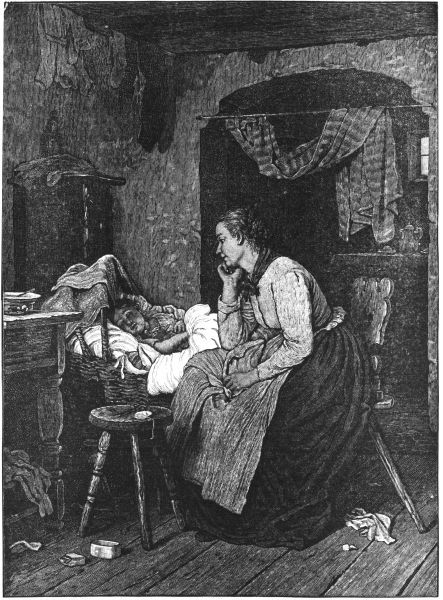 HUSH-A-BY.
HUSH-A-BY.
VOL. XXX.—NO. 5.
[322]
HUSH-A-BY.
Hush-a-by baby: as the birds fly,
We are off to the island of Lullaby:
I am the captain, and you are the crew,
And the cradle, I guess, is our birch-bark canoe;
We'll drift away from this work-day shore,
Forty thousand long leagues or more,
Till we reach the strand where happy dreams wait,
Whether we're early, or whether we're late.
Hush-a-by baby: as the birds fly,
Let us make the snug harbor of Lullaby:
Some little folks are far on the way;
Some have put in at Wide-awake Bay;
Others, I fear, are long overdue;
Don't let this happen, my darling, to you:
Let us steer for the coast where happy dreams wait,
Whether we're early, or whether we're late.
MARY N. PRESCOTT.
[323]
WHERE JIMMY LIVES.
IMMY MASON lives on a ranche in Colorado. Do
you know what a ranche is? It is a kind of
farm,—not a farm for raising wheat and potatoes
and oats and corn, but for rearing horses and
cattle and sheep.
Jimmy's papa has about a hundred horses, as many cows,
and a great many hundred sheep. He does not keep them
in barns, or feed them with hay, but they roam over the
hills, and feed on grass both in winter and summer.
Mr. Mason's house is five miles from any neighbor, and
fifteen miles from town. There is no garden or fence round
it, and there are no trees to be seen anywhere near. But
there are wild flowers in abundance. One of them is a
species of cactus. It bears beautiful yellow blossoms in
summer, after which comes the fruit, a prickly pear, not[324]
good to eat. Another kind of cactus has crimson and
scarlet blossoms, but no prickly pears.
Both of these plants are covered with sharp thorns and
prickles. Jimmy thinks the blossoms are pretty; but he
does not like to pick them. Can you guess why?
Where do you suppose Jimmy goes to school? Well, he
goes to his mamma, and he has a very nice teacher. He
never gets lonesome; for he has so much to do and so much
to think about, that he has no time to be lonesome.
He helps his mother in the house, he takes care of the
chickens, he makes friends with the sheep. When he gets
a little bigger, he will ride on horseback and help his papa
in taking care of the horses and cattle out on the hills.
EMMA MITCHELL.
JESSIE AND HER KITTEN.
MAMMA!" said little Jessie one stormy afternoon,
"I'm tired of playing with dolly, I'm tired of looking
at pictures, I'm tired of my blocks, and I'm tired of
sitting still. What shall I do?"
"Call kitty," said her mother, "and let her try to
catch this ball while you hold the string."
"Oh, yes, that will be fun," said Jessie; "but if I make
a noise, mamma, you will be sure to say, 'Hush, my child!
or you will wake grandma.'"
Her mamma laughed, and said, "I think we can manage
that, dear. You shall go down in the large front-hall, and
there you can run and play as much as you please."
Jessie was delighted with this plan, and presently stood
holding the ball just out of reach of the kitten's paws,
saying, "Catch it if you can, kitty; catch it if you can!"
[325]
As soon as kitty, standing on her hind-legs, had her paw
almost upon it, away Jessie would run, shouting and laughing,
and kitty would follow her as fast as she could go.
When they had played till Jessie was quite tired, she
went to her mamma with kitty cuddled in her arms, and
said, "We have had a jolly time, mamma! Now I must
give kitty some milk and put her to bed; for I think she is
hungry and sleepy after so much exercise." This last was a
big word for such a little girl, and she said it quite slowly.
"Yes, dear," mamma said, smiling, "and I think I know
somebody else who will soon be hungry and sleepy too."
JANE OLIVER.
[326]
TWO SIDES.
H, dear! oh, dear! the summer's past;
The singing-birds have gone;
The robin, from the maple-bough,
Who waked me every morn;
The bobolink that used to make
The meadow-grass with music shake;
The humming-bird that dipped his bill
In lily-cup and rose,—
Not one would stay; I only hear
The cawing of the crows.
The fields look brown: oh, dear! oh, dear!
The dismal autumn days are here.
And all my pretty flowers are dead!
My roses and sweet-peas;
The hollyhocks, where, all the day,
There was a crowd of bees;
The lovely morning-glory vine,
That round my window used to twine;
The larkspur, with its horns of blue;
[327]The sunflower proud and tall,—
That thief the Frost, so sly and still,
Has come and stolen all!
Chill blows the wind; oh, dear! oh, dear!
The dreary autumn days are here.
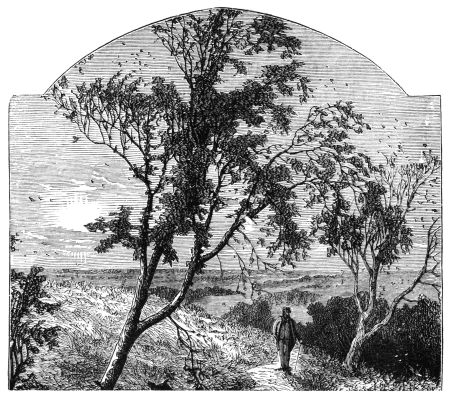
The hives are full of honeycomb;
The barns are full of hay;
The bins are heaped with ripened grain,
[328]That empty were in May;
The red and yellow apples now
Bend many a heavy orchard bough;
Dark purple, 'mid their withered leaves,
The frost-grapes smell of musk;
The pumpkins lie in yellow heaps;
And, in its silver husk,
The corn now shows a golden ear;
Come! why be sorry autumn's here?
The sharp frost cracks the prickly burrs;
The keen wind scatters down
Upon the grass, for eager hands,
The chestnuts ripe and brown;
The orange woods, the flame-red bowers,
Are brighter than the gayest flowers;
'Tis constant changes make the year:
Then why be sorry autumn's here?
MARIAN DOUGLAS.
[329]
FANCHETTE.
HILE spending a winter in a quiet old town in
Southern France, I used to meet in my walks, a
girl about ten years of age, trudging along, bare-footed,
carrying on her arm a large basket.
The first time we met she looked up at me with
such a pleasant smile, that I bowed and smiled in return.
After a few days we became still better acquainted, and she
would say, "Bon jour, madame!" in answer to my greeting.
One day, besides the basket, she carried a large fagot, and[330]
her apron full of wild flowers and drooping vines. Then I
thought I would like to know more about her. So I said,
"You look tired, my little girl: will you not sit down under
this old tree with me, and tell me where you live, and where
you go every day with that big basket?"
She seemed quite pleased to do so, and then told me that
her father was a wood-cutter, and that every day she had to
walk three miles to the forest to carry him his dinner, and
sometimes to help bind fagots.
"My name," she said, "is Fanchette, and I have a sister
Marie, and a sister Claire, and a baby-brother named Pierre.
My sister Marie is ill, and cannot leave her bed, and I have
gathered these flowers to take to her."
"But are you not tired with walking so far?"
"A little tired, madam," she said; "but I do not mind,
for Marie will be so pleased with these flowers, and baby
will clap his hands and laugh when he sees me coming.
Then mother will take this fagot and light the fire, and give
us our supper, and we shall be very merry.
"There is my home," she said, pointing to a small brown
thatched cottage under a hill not far away. "Will you not
come to see us some day, madam?"
I promised to do so, and when I kept my word soon after,
I found all as she had said. Though they were poor, and
the mother had to work hard, their home was so neat, and
all seemed so happy in it, that it was a pleasure to go there.
I repeated my visits many times, carrying dainties for the
invalid, who was soon quite well and strong; and I shall
never forget bright, cheery little Fanchette.
ANNA LIVINGSTON.
[331]
SWEET GOOD-DAY.
"We are fading, little children;
One by one, we flutter down;
For the winds are harsh and chilly,
And the meadows, bare and brown.
We are fading," leaves of purple,
Leaves of amber, softly say;
"But we'll meet you in the May-time,
Our merry, merry play-time:
Little children, sweet good-day!"
"We are going, little children,"
Sigh the flowers in the sun;
"Oh! we soon shall end our singing,"
Lisp the brooklets as they run;
And the birds, with silver warble,
Long before they wing away,
Pipe, "We'll meet you in the May-time,
Our merry, merry play-time:
Little children, sweet good-day!"
GEORGE COOPER.
[332]
MY GARDEN.
When fields are green, and skies are fair,
And summer fragrance fills the air,
I love to watch the budding rose
That in my pleasant garden grows;
But when old Winter, fierce and free,
Has hushed the murmur of the bee,
And all the fields and hills are hid
Beneath his snowy coverlid,
Oh! then my only garden-spot
Is just this little flower-pot.
X. V. Z.
[333]
OLD JACK.
EAR me!" exclaimed Mrs. Smith, as she looked from
the kitchen-window of her farmhouse; "there are
uncle Joe, and aunt Peggy, and all the girls! They
have come to tea, I'm certain, and I haven't a speck
of green tea in the house. Uncle Joe can't drink
any thing else, and he must have white sugar in it too.
"Here, Mike, Mike! take a basket, jump on old Jack, and
go to the store just as fast as you can. Get a pound of the[334]
best green tea and three pounds of white lump sugar. Now
mind you are back in half an hour."
Mike was delighted. He had come to live on the farm
only the week before, and in all his life had never been on
the back of a horse or donkey. He had looked every day
with longing eyes at Jack grazing quietly in the pasture,
and had thought how happy he should be if he were ever
allowed to have a ride on him. So off he started in great
glee, saying to himself, "It will be easy enough to manage
this little fellow."
When about half a mile on the way, they came to a brook,
and Mike thought he would let Jack have a drink. This
was all very well; but, when Mike wanted to go on, Jack
had changed his mind, and concluded not to go any further.
Mike pulled and pulled on the bridle, trying to turn him
back into the road; but the obstinate creature planted his
feet firmly, and would not budge an inch.
Just then a kind old Irishman came, on the little foot-bridge,
over the brook, and Mike called to him to know what
he should do. "Sure, you must have a stick, sonny," said
the man. "Donkeys won't go without the stick."
So he cut a stick from a tree near by, and gave it to Mike,
who used it as hard as he could, but to no purpose. Then
the old man took another, and, going behind the little beast,
touched him up smartly with it, at the same time giving his
tail a funny little twist.
This was more than Jack could stand. He gave in and
jogged on. But he would go very slowly, in spite of Mike's
urging, and now and then he would amuse himself by kicking
out his hind-legs, and trying to throw Mike off.
Once, too, just as they were starting back from the
grocer's he suddenly lay down flat, and threw Mike over his
head, scattering basket and bundles.[335]
Poor Mike was half an hour late; but, when he told good
Mrs. Smith all his troubles, she excused him. She laughed
hard, too, when Mike said, like a true-born Irish boy, "Sure,
marm, I never want to ride Jack again till I've learned
how."
IDA FAY.
OFF FOR THE WINTER.
"O swallows! what can be the matter?
And what do you mean by your chatter?
You sit on the barn-roof by dozens,—
Aunts, grandmothers, uncles, and cousins;
You circle and wheel, then you twitter away:
[336]Oh, what are you saying? Do tell me, I pray."
"My little one, cold winds are blowing;
We swallows to South-land are going:
We meet in the clear autumn weather,
And plan our long journey together.
When spring-time returns, with its green dancing leaves,
We'll come back to our little nests under the eaves."
"Sweet wild flowers, oh, where are you hiding?
In what hidden nook are you biding?
I've wandered the meadows all over,—
There's no breath of wild rose or clover;
No violets peeping through grass-blades I see,
No daisies or buttercups nodding to me."
Then up spake a gentian, late comer,
The last blue-eyed darling of summer,—
"To our long winter rest we betake us:
Good-night, till May breezes awake us."
Then her soft downy cap she drew over her head,
And joined her sweet sisters asleep in their bed.
RUTH REVERE.
[337]
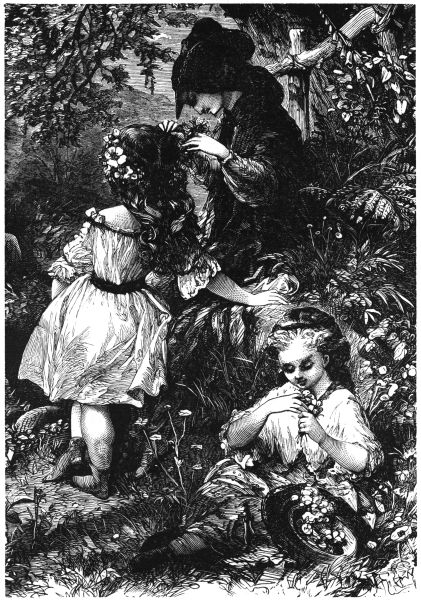 A DAY IN THE WOODS.
A DAY IN THE WOODS.
VOL. XXX.—NO. 5.
[338]
A DAY IN THE WOODS.
UTUMN days are going fast. Who
wants to spend a day in the woods?"
said uncle Tom to his nieces Jennie
and Kate.
"I!" shouted Jennie; "and I!"
shouted Kate; "and can aunt Jane and
cousins Tom and Ann go too?" said both.
"Yes," said uncle Tom: "I will take
the big wagon, and there will be room enough for all. Run
and ask your mother to put up a lunch for us. We must
start early in the morning."
Off they ran, and soon came back with Tom and Ann and
their little brother Johnny, all eager for a frolic.
The next morning, as soon as the sun peeped out of the
east, all the children were up and dressed. By the time
breakfast was over, the wagon stood at the door. Into
it they climbed one after another. The lunch-basket was
packed in safely. Aunt Jane sat on the front seat; uncle
Tom jumped up beside her with the reins in his hands; the
children shouted "Hurrah!" and off they started.
What fun they had as they rode along! The pure air
of the country, flavored with an odor of the sea (for the
road lay along the side of the ocean), seemed to put new
life into them all.
When they reached the woods, they jumped out of the
wagon and rambled about at will. The girls filled their
baskets with wild flowers; aunt Jane twined some of them[339]
in Kate's hair; and Jennie made a lovely wreath, which
she placed on Tom's head.
By and by they all began
to feel very hungry. So they
opened the lunch-basket under
a large tree, and found that
mamma had put into it just
what they wanted. They had
a grand feast. They laughed
and sang, and made the old
woods ring with their merry
voices. At last uncle Tom said, "Now, girls, give us one
song more, and then we must be getting ready to go
home."
While they were singing, uncle Tom went after the horse.
Pretty soon he drove up
with the wagon and said,
"Now pack in, every one
of you, and we will have
a jolly ride home."
They were about to
take their seats in the
wagon, when aunt Jane
said, "Where's Johnny?
We can't go home without
him."
Sure enough, Johnny
was missing.
"He strolled off while
we were singing," said
cousin Tom: "I guess he
went down to the beach;
for I saw him go in that[340]
direction, and he had a box under his arm, probably to put
shells in."
"I'll warrant that's where he's gone," said uncle Tom.
"And he is there exploring now, I dare say. But he can't
be far off. We'll call him."
Then uncle Tom shouted in his deep voice, "Johnny!"
Then aunt Jane and all the girls joined in the chorus of
"Johnny!"
"The boy must be deaf if he does not hear that," said
uncle Tom. Then they all shouted together once more. In
a moment they heard Johnny's voice in reply. "I'm coming
in a minute," said he.
"Hurry up," cried uncle Tom. "We are waiting for you."
It was five minutes before Johnny appeared, and then he
came holding something in his hand triumphantly.
"What in the world have you there?" said aunt Jane.
"Something better than wild flowers," said Johnny.
Now what do you suppose it was? It was a live crab,
which the boy had found among the rocks on the shore.
"You are not going to take it home with you, are you?"
said aunt Jane.
"Of course I am," said Johnny.
"Well, jump in," said uncle Tom, "crab and all. We
can't stop any longer."
So Johnny scrambled into the wagon with the rest, and
off they drove.
UNCLE SAM.
[341]
BABY BOBBY.
I know a house so full of noise,
You'd think a regiment of boys,
From early morn till close of day,
Were busy with their romping play.
And yet, I'm ready to declare,
There is but one small youngster there,—
A little golden-headed chap,
Who used to think his mother's lap
The nicest place that e'er could be,
Until he grew so big that he
Was most a man, and learned what fun
[342]It is to shout and jump and run.
This restless, noisy little elf
Has learned, alas! to think himself
Too old in mother's arms to sleep;
Yet his blue eyes he cannot keep
From hiding 'neath their lids so white;
And, climbing to the sofa's height,
He snuggles down, forgets his play,
And into Dreamland sails away;
And then it is that mamma knows
Why the whole house so silent grows.
MARY D. BRINE.
MILLY AND JIP.
HIS is a little English girl. Her name is Mildred; but
she is usually called Milly. She has always lived in
a fine old house, with lovely grounds about it, not far
from London. But now she is going, with her father and
mother, to India.
She thinks it will be very nice to be travelling so far
away with them; but she is sorry to leave her kind grandmother,
and all her aunts and cousins. She could not help
crying when she said good-by to them.
"I cannot go without my Jip," she said to her mother
the day before leaving.
"Oh, no, darling!" said her mother. "I wouldn't think
of leaving the little dog behind. He will be a fine play-fellow
for you on board the ship."
So she has Jip cuddled close in her arms, you see. It is[343]
late in November, and the weather is cold. But Milly has
plenty of warm fur wraps to protect her and her pet too.
She will soon be far away from cold weather, and when
she reaches India, she will laugh at the thought of ever
being bundled up in all that fur.
JANE OLIVER.
[344]
LAWN-TENNIS.
John sits on a three-legged
stool. What is
he doing? We can't
tell, for we can't see
through him: so we
must guess. I guess
he is watching a game of lawn-tennis.
I think I see one of the
players that John has
his eye on. It is a
bright little girl. Her
name is Julia. Look
at her. She is having
fine fun. John hopes
that her side will win.
And so do I. Let us all give
three cheers for her.
M. L. O.
[345]
THE KITTEN'S NECKTIE.
USS, Puss, Puss! where are you?" said little Nellie
Rich. She had tied a new, bright, cherry ribbon
on the kitten's neck, and told her to keep it nice;
"for," said Nellie, "my cousin Belle is coming to see
me this afternoon, and I want to show her how
pretty you can look."
And now naughty puss had run off, and she would come
back, perhaps, with the new ribbon all rumpled and soiled.
After searching through the house, Nellie ran out to the
barn to look for the lost pet.
Sure enough, there was the kitten, not taking the least
care of her necktie, just ready to pounce upon a big mouse.
Nellie's voice startled her so that she did not catch the
mouse, after all. The nimble little rogue darted into a hole
before kitty could even get her paw on his tail.
But the cherry bow was still safe and unsoiled. So, after[346]
giving pussy a lecture on her disobedience, Nellie took her
into the house.
She met Belle at the door, and told her what a search she
had made; while puss, cuddled in her arms, kept up a busy
purring, as much as to say, "I'm sorry you were displeased
with me. I really thought you would praise me for trying
to catch that big mouse; for I'm not much more than a
kitten yet."
DORA BURNSIDE.
A THRIFTY FAMILY.
'Twas a bitter cold morning; the new-fallen snow
Had pierced every crack where a snowflake could go;
The streams were all solid, the ice sharp and clear;
And even the fishes were chilly, I fear.
Almost all the wild creatures were troubled and cold,
And sighed for sweet summer,—the shy and the bold;
But one thrifty family, as you must know,
Was breakfasting merrily under the snow.
Close by a tall tree, in a hole in the ground,
Which led to a parlor, with leaves cushioned round,
Five jolly red squirrels were sitting at ease,
And eating their breakfast, as gay as you please.
D. H. R. Goodale.
[347]
When will the snow come, mother dear?
When will the soft white snow be here?
Upon my sled I want to go:
Oh for the snow! I long for snow.
I want to see it falling fast,
And covering all the ground at last,
So Dick and I can snowballs throw:
Oh for the snow, the splendid snow!
I look, as soon as it is light,
To see if all the earth is white;
I watch the clouds each day, but no,
There's not a single flake of snow.
I want to plunge about, waist deep,
In the great drifts so high and steep,
And wash Dick's face,—oh, you don't know
[348]What lots of fun we have with snow!
We're going to build a fort, and you'll
See battles fought there after school!
And cannon-balls will fly—hallo!
Look! mother, look! here comes the snow!
ELIZABETH SILL.
A BASKET FROM HOME.
ALLOA, boys! Here's old Trott, the expressman,
coming into the yard. What do you suppose he has
brought?" exclaimed one of a group of boys in the
playground of a country boarding-school.
"It is probably a box for me," said one of the
older boys, with rather an important air.
This boy, being somewhat selfish, was not a favorite with
the little ones, one of whom whispered to another, "I hope
it isn't for him, don't you? None of the rest of us will get
a peep into it if it is."
Presently the wagon stopped; and Mr. Trott pulled out a
basket, and reading the address, "Master Robert Rand,"
said, "Is there any boy of that name here?"
A bright little fellow answered quickly, "That is my
name."
"Then this basket is yours," said the driver.
"Hurrah for you, Rob!" called out four other boys about
his age. "Come on, we'll help you carry it in."
In a few minutes the same boys stood around the basket
with eager eyes; and Rob and his cousin Willy were seated
on the floor, unpacking it.
Oranges, lemons, and apples were soon displayed; then a
pot of jam appeared.[349]
"Halloa, what's down in that corner?" cried Tom, a
youngster in Scotch cap and velveteen suit. "Isn't that a
cake, though!" as a big round cake well stuffed with plums
appeared.
"And there's a box of sardines," shouted another boy.
"What's in this paper bag?" said Rob. "First-rate!
it's white sugar. That's for lemonade. Mother hasn't
forgotten how much I like it."
So all the good things that Rob's thoughtful mother had
sent him were one by one set out upon the floor.
Rob looked at each one with real delight, and, when the
basket was emptied, he said,—
"Now, boys, there's some eating to be done, and I want
you all to help me. It is Saturday afternoon: let us all go
into the woods and have a regular picnic."
All agreed that this would be jolly fun. One boy (who[350]
had a brother in college) remarked that it would be "just
immense."
Willy, the youngest boy, who was a great pet with the
housekeeper, was sent to borrow a pitcher and tumblers, and
whatever else was needed.
Instead of a pitcher, what do you think he brought back?—A
teakettle, just like this!
"Why, what did you bring that for?"
said Rob.
"Because I thought a pitcher wouldn't
hold lemonade enough," said Willy.
"There's something in that," said Tom.
"We'll put something in it, anyhow," said Rob; and they
all had a good laugh.
Several other boys joined them at Rob's invitation, and
they soon found a pleasant, shady spot near a cool spring.
"Very handy," said Tom, "for making lemonade."
We have not space to tell all the good things that were
said at the feast. In fact, there was no reporter present.
But it was a jolly affair. When it was ended, three cheers
were given for Robby Rand, and three more for his basket;
and then the boys started for home, to wind up the fun with
a game of ball.
UNCLE CHARLES.
A LETTER FROM HONOLULU.
AST Christmas my mamma gave me a bound volume
of "The Nursery," and I have been wanting to tell
you how much I like it.
I live in Honolulu, way off in the Pacific Ocean.
I wonder if many of your readers know what a
pretty place Honolulu is. The town faces the open sea;[351]
but those who have been accustomed to the stormy Atlantic
or the Northern Pacific would scarcely believe that this
calm blue water is the ocean.
Back of the town are two mountains,—"Punch-bowl"
and "Diamond Head." Between them there is a cocoanut-grove,
near which there is a nice place for sea-bathing. As
it is a short drive from town, we often go there to bathe,
and have great fun. We have no winter here, and it is
never too cold to bathe. I am trying to learn to swim.
Sometimes I get tired of having it always summer, and
wish for the fun that the snow and ice bring, about which
I read so much in "The Nursery."
I go to a kindergarten, and we learn a great many of
your songs. Some of your poetry we have made into songs,
and we like them very much. Last summer, at the closing
exercises of our class, we played the "Kindergarten Game"
published in the January number of last year, and every
one was delighted with it.
If you like this letter I may write again, and tell you
about a feast that I went to, in celebration of the birthday
of the little Victoria-Kawekin-Kaiulani-Lunalilo-Kalaninuiahilapalapa.
Is it not a pretty name? I cannot pronounce
it all for I do not speak the native language. I am a little
German girl and my name is
ALEXANDRA.
[352]
CHRISTMAS TIME.
T. Crampton.
[Transcriber's Note: You can play this music (MIDI file) by clicking here
and a larger image
of the music sheet may be seen by clicking on the image.]
1. Come, stir the fire, 'tis Christmas time!
While loud the winds howl o'er us,
We'll hail the day with joyful lay,
And raise the swelling chorus.
Time, who brings both care and sorrow,
Bids them slumber till to-morrow,
Bids them slumber till to-morrow.
2 To joyous music's merry strain
Responsive hearts are beating,
And happy voices join amain
The carol, Christmas greeting.
Hearts with fondest rapture swelling,
Glow while lips their thoughts are telling.
3 Then raise the song for Christmas time,
While winds are loudly blowing,
With carol old and chorus bold
Our joyful praises showing,
Bright the old yule-log is beaming,
Let each soul of joy be dreaming.

Transcriber's Notes
Obvious punctuation errors repaired.
The original text for the July issue had a table of contents that
spanned six issues. This was divided amongst those issues.
Additionally, only the July issue had a title page. This page was
copied for the remaining five issues. Each issue had the number added on
the title page after the Volume number.
End of Project Gutenberg's The Nursery, November 1881, Vol. XXX, by Various
*** END OF THIS PROJECT GUTENBERG EBOOK THE NURSERY, NOVEMBER 1881 ***
***** This file should be named 42160-h.htm or 42160-h.zip *****
This and all associated files of various formats will be found in:
http://www.gutenberg.org/4/2/1/6/42160/
Produced by Emmy, Juliet Sutherland and the Online
Distributed Proofreading Team at http://www.pgdp.net Music
transcribed by Veronika Redfern.
Updated editions will replace the previous one--the old editions
will be renamed.
Creating the works from public domain print editions means that no
one owns a United States copyright in these works, so the Foundation
(and you!) can copy and distribute it in the United States without
permission and without paying copyright royalties. Special rules,
set forth in the General Terms of Use part of this license, apply to
copying and distributing Project Gutenberg-tm electronic works to
protect the PROJECT GUTENBERG-tm concept and trademark. Project
Gutenberg is a registered trademark, and may not be used if you
charge for the eBooks, unless you receive specific permission. If you
do not charge anything for copies of this eBook, complying with the
rules is very easy. You may use this eBook for nearly any purpose
such as creation of derivative works, reports, performances and
research. They may be modified and printed and given away--you may do
practically ANYTHING with public domain eBooks. Redistribution is
subject to the trademark license, especially commercial
redistribution.
*** START: FULL LICENSE ***
THE FULL PROJECT GUTENBERG LICENSE
PLEASE READ THIS BEFORE YOU DISTRIBUTE OR USE THIS WORK
To protect the Project Gutenberg-tm mission of promoting the free
distribution of electronic works, by using or distributing this work
(or any other work associated in any way with the phrase "Project
Gutenberg"), you agree to comply with all the terms of the Full Project
Gutenberg-tm License available with this file or online at
www.gutenberg.org/license.
Section 1. General Terms of Use and Redistributing Project Gutenberg-tm
electronic works
1.A. By reading or using any part of this Project Gutenberg-tm
electronic work, you indicate that you have read, understand, agree to
and accept all the terms of this license and intellectual property
(trademark/copyright) agreement. If you do not agree to abide by all
the terms of this agreement, you must cease using and return or destroy
all copies of Project Gutenberg-tm electronic works in your possession.
If you paid a fee for obtaining a copy of or access to a Project
Gutenberg-tm electronic work and you do not agree to be bound by the
terms of this agreement, you may obtain a refund from the person or
entity to whom you paid the fee as set forth in paragraph 1.E.8.
1.B. "Project Gutenberg" is a registered trademark. It may only be
used on or associated in any way with an electronic work by people who
agree to be bound by the terms of this agreement. There are a few
things that you can do with most Project Gutenberg-tm electronic works
even without complying with the full terms of this agreement. See
paragraph 1.C below. There are a lot of things you can do with Project
Gutenberg-tm electronic works if you follow the terms of this agreement
and help preserve free future access to Project Gutenberg-tm electronic
works. See paragraph 1.E below.
1.C. The Project Gutenberg Literary Archive Foundation ("the Foundation"
or PGLAF), owns a compilation copyright in the collection of Project
Gutenberg-tm electronic works. Nearly all the individual works in the
collection are in the public domain in the United States. If an
individual work is in the public domain in the United States and you are
located in the United States, we do not claim a right to prevent you from
copying, distributing, performing, displaying or creating derivative
works based on the work as long as all references to Project Gutenberg
are removed. Of course, we hope that you will support the Project
Gutenberg-tm mission of promoting free access to electronic works by
freely sharing Project Gutenberg-tm works in compliance with the terms of
this agreement for keeping the Project Gutenberg-tm name associated with
the work. You can easily comply with the terms of this agreement by
keeping this work in the same format with its attached full Project
Gutenberg-tm License when you share it without charge with others.
1.D. The copyright laws of the place where you are located also govern
what you can do with this work. Copyright laws in most countries are in
a constant state of change. If you are outside the United States, check
the laws of your country in addition to the terms of this agreement
before downloading, copying, displaying, performing, distributing or
creating derivative works based on this work or any other Project
Gutenberg-tm work. The Foundation makes no representations concerning
the copyright status of any work in any country outside the United
States.
1.E. Unless you have removed all references to Project Gutenberg:
1.E.1. The following sentence, with active links to, or other immediate
access to, the full Project Gutenberg-tm License must appear prominently
whenever any copy of a Project Gutenberg-tm work (any work on which the
phrase "Project Gutenberg" appears, or with which the phrase "Project
Gutenberg" is associated) is accessed, displayed, performed, viewed,
copied or distributed:
This eBook is for the use of anyone anywhere at no cost and with
almost no restrictions whatsoever. You may copy it, give it away or
re-use it under the terms of the Project Gutenberg License included
with this eBook or online at www.gutenberg.org
1.E.2. If an individual Project Gutenberg-tm electronic work is derived
from the public domain (does not contain a notice indicating that it is
posted with permission of the copyright holder), the work can be copied
and distributed to anyone in the United States without paying any fees
or charges. If you are redistributing or providing access to a work
with the phrase "Project Gutenberg" associated with or appearing on the
work, you must comply either with the requirements of paragraphs 1.E.1
through 1.E.7 or obtain permission for the use of the work and the
Project Gutenberg-tm trademark as set forth in paragraphs 1.E.8 or
1.E.9.
1.E.3. If an individual Project Gutenberg-tm electronic work is posted
with the permission of the copyright holder, your use and distribution
must comply with both paragraphs 1.E.1 through 1.E.7 and any additional
terms imposed by the copyright holder. Additional terms will be linked
to the Project Gutenberg-tm License for all works posted with the
permission of the copyright holder found at the beginning of this work.
1.E.4. Do not unlink or detach or remove the full Project Gutenberg-tm
License terms from this work, or any files containing a part of this
work or any other work associated with Project Gutenberg-tm.
1.E.5. Do not copy, display, perform, distribute or redistribute this
electronic work, or any part of this electronic work, without
prominently displaying the sentence set forth in paragraph 1.E.1 with
active links or immediate access to the full terms of the Project
Gutenberg-tm License.
1.E.6. You may convert to and distribute this work in any binary,
compressed, marked up, nonproprietary or proprietary form, including any
word processing or hypertext form. However, if you provide access to or
distribute copies of a Project Gutenberg-tm work in a format other than
"Plain Vanilla ASCII" or other format used in the official version
posted on the official Project Gutenberg-tm web site (www.gutenberg.org),
you must, at no additional cost, fee or expense to the user, provide a
copy, a means of exporting a copy, or a means of obtaining a copy upon
request, of the work in its original "Plain Vanilla ASCII" or other
form. Any alternate format must include the full Project Gutenberg-tm
License as specified in paragraph 1.E.1.
1.E.7. Do not charge a fee for access to, viewing, displaying,
performing, copying or distributing any Project Gutenberg-tm works
unless you comply with paragraph 1.E.8 or 1.E.9.
1.E.8. You may charge a reasonable fee for copies of or providing
access to or distributing Project Gutenberg-tm electronic works provided
that
- You pay a royalty fee of 20% of the gross profits you derive from
the use of Project Gutenberg-tm works calculated using the method
you already use to calculate your applicable taxes. The fee is
owed to the owner of the Project Gutenberg-tm trademark, but he
has agreed to donate royalties under this paragraph to the
Project Gutenberg Literary Archive Foundation. Royalty payments
must be paid within 60 days following each date on which you
prepare (or are legally required to prepare) your periodic tax
returns. Royalty payments should be clearly marked as such and
sent to the Project Gutenberg Literary Archive Foundation at the
address specified in Section 4, "Information about donations to
the Project Gutenberg Literary Archive Foundation."
- You provide a full refund of any money paid by a user who notifies
you in writing (or by e-mail) within 30 days of receipt that s/he
does not agree to the terms of the full Project Gutenberg-tm
License. You must require such a user to return or
destroy all copies of the works possessed in a physical medium
and discontinue all use of and all access to other copies of
Project Gutenberg-tm works.
- You provide, in accordance with paragraph 1.F.3, a full refund of any
money paid for a work or a replacement copy, if a defect in the
electronic work is discovered and reported to you within 90 days
of receipt of the work.
- You comply with all other terms of this agreement for free
distribution of Project Gutenberg-tm works.
1.E.9. If you wish to charge a fee or distribute a Project Gutenberg-tm
electronic work or group of works on different terms than are set
forth in this agreement, you must obtain permission in writing from
both the Project Gutenberg Literary Archive Foundation and Michael
Hart, the owner of the Project Gutenberg-tm trademark. Contact the
Foundation as set forth in Section 3 below.
1.F.
1.F.1. Project Gutenberg volunteers and employees expend considerable
effort to identify, do copyright research on, transcribe and proofread
public domain works in creating the Project Gutenberg-tm
collection. Despite these efforts, Project Gutenberg-tm electronic
works, and the medium on which they may be stored, may contain
"Defects," such as, but not limited to, incomplete, inaccurate or
corrupt data, transcription errors, a copyright or other intellectual
property infringement, a defective or damaged disk or other medium, a
computer virus, or computer codes that damage or cannot be read by
your equipment.
1.F.2. LIMITED WARRANTY, DISCLAIMER OF DAMAGES - Except for the "Right
of Replacement or Refund" described in paragraph 1.F.3, the Project
Gutenberg Literary Archive Foundation, the owner of the Project
Gutenberg-tm trademark, and any other party distributing a Project
Gutenberg-tm electronic work under this agreement, disclaim all
liability to you for damages, costs and expenses, including legal
fees. YOU AGREE THAT YOU HAVE NO REMEDIES FOR NEGLIGENCE, STRICT
LIABILITY, BREACH OF WARRANTY OR BREACH OF CONTRACT EXCEPT THOSE
PROVIDED IN PARAGRAPH 1.F.3. YOU AGREE THAT THE FOUNDATION, THE
TRADEMARK OWNER, AND ANY DISTRIBUTOR UNDER THIS AGREEMENT WILL NOT BE
LIABLE TO YOU FOR ACTUAL, DIRECT, INDIRECT, CONSEQUENTIAL, PUNITIVE OR
INCIDENTAL DAMAGES EVEN IF YOU GIVE NOTICE OF THE POSSIBILITY OF SUCH
DAMAGE.
1.F.3. LIMITED RIGHT OF REPLACEMENT OR REFUND - If you discover a
defect in this electronic work within 90 days of receiving it, you can
receive a refund of the money (if any) you paid for it by sending a
written explanation to the person you received the work from. If you
received the work on a physical medium, you must return the medium with
your written explanation. The person or entity that provided you with
the defective work may elect to provide a replacement copy in lieu of a
refund. If you received the work electronically, the person or entity
providing it to you may choose to give you a second opportunity to
receive the work electronically in lieu of a refund. If the second copy
is also defective, you may demand a refund in writing without further
opportunities to fix the problem.
1.F.4. Except for the limited right of replacement or refund set forth
in paragraph 1.F.3, this work is provided to you 'AS-IS', WITH NO OTHER
WARRANTIES OF ANY KIND, EXPRESS OR IMPLIED, INCLUDING BUT NOT LIMITED TO
WARRANTIES OF MERCHANTABILITY OR FITNESS FOR ANY PURPOSE.
1.F.5. Some states do not allow disclaimers of certain implied
warranties or the exclusion or limitation of certain types of damages.
If any disclaimer or limitation set forth in this agreement violates the
law of the state applicable to this agreement, the agreement shall be
interpreted to make the maximum disclaimer or limitation permitted by
the applicable state law. The invalidity or unenforceability of any
provision of this agreement shall not void the remaining provisions.
1.F.6. INDEMNITY - You agree to indemnify and hold the Foundation, the
trademark owner, any agent or employee of the Foundation, anyone
providing copies of Project Gutenberg-tm electronic works in accordance
with this agreement, and any volunteers associated with the production,
promotion and distribution of Project Gutenberg-tm electronic works,
harmless from all liability, costs and expenses, including legal fees,
that arise directly or indirectly from any of the following which you do
or cause to occur: (a) distribution of this or any Project Gutenberg-tm
work, (b) alteration, modification, or additions or deletions to any
Project Gutenberg-tm work, and (c) any Defect you cause.
Section 2. Information about the Mission of Project Gutenberg-tm
Project Gutenberg-tm is synonymous with the free distribution of
electronic works in formats readable by the widest variety of computers
including obsolete, old, middle-aged and new computers. It exists
because of the efforts of hundreds of volunteers and donations from
people in all walks of life.
Volunteers and financial support to provide volunteers with the
assistance they need are critical to reaching Project Gutenberg-tm's
goals and ensuring that the Project Gutenberg-tm collection will
remain freely available for generations to come. In 2001, the Project
Gutenberg Literary Archive Foundation was created to provide a secure
and permanent future for Project Gutenberg-tm and future generations.
To learn more about the Project Gutenberg Literary Archive Foundation
and how your efforts and donations can help, see Sections 3 and 4
and the Foundation information page at www.gutenberg.org
Section 3. Information about the Project Gutenberg Literary Archive
Foundation
The Project Gutenberg Literary Archive Foundation is a non profit
501(c)(3) educational corporation organized under the laws of the
state of Mississippi and granted tax exempt status by the Internal
Revenue Service. The Foundation's EIN or federal tax identification
number is 64-6221541. Contributions to the Project Gutenberg
Literary Archive Foundation are tax deductible to the full extent
permitted by U.S. federal laws and your state's laws.
The Foundation's principal office is located at 4557 Melan Dr. S.
Fairbanks, AK, 99712., but its volunteers and employees are scattered
throughout numerous locations. Its business office is located at 809
North 1500 West, Salt Lake City, UT 84116, (801) 596-1887. Email
contact links and up to date contact information can be found at the
Foundation's web site and official page at www.gutenberg.org/contact
For additional contact information:
Dr. Gregory B. Newby
Chief Executive and Director
[email protected]
Section 4. Information about Donations to the Project Gutenberg
Literary Archive Foundation
Project Gutenberg-tm depends upon and cannot survive without wide
spread public support and donations to carry out its mission of
increasing the number of public domain and licensed works that can be
freely distributed in machine readable form accessible by the widest
array of equipment including outdated equipment. Many small donations
($1 to $5,000) are particularly important to maintaining tax exempt
status with the IRS.
The Foundation is committed to complying with the laws regulating
charities and charitable donations in all 50 states of the United
States. Compliance requirements are not uniform and it takes a
considerable effort, much paperwork and many fees to meet and keep up
with these requirements. We do not solicit donations in locations
where we have not received written confirmation of compliance. To
SEND DONATIONS or determine the status of compliance for any
particular state visit www.gutenberg.org/donate
While we cannot and do not solicit contributions from states where we
have not met the solicitation requirements, we know of no prohibition
against accepting unsolicited donations from donors in such states who
approach us with offers to donate.
International donations are gratefully accepted, but we cannot make
any statements concerning tax treatment of donations received from
outside the United States. U.S. laws alone swamp our small staff.
Please check the Project Gutenberg Web pages for current donation
methods and addresses. Donations are accepted in a number of other
ways including checks, online payments and credit card donations.
To donate, please visit: www.gutenberg.org/donate
Section 5. General Information About Project Gutenberg-tm electronic
works.
Professor Michael S. Hart was the originator of the Project Gutenberg-tm
concept of a library of electronic works that could be freely shared
with anyone. For forty years, he produced and distributed Project
Gutenberg-tm eBooks with only a loose network of volunteer support.
Project Gutenberg-tm eBooks are often created from several printed
editions, all of which are confirmed as Public Domain in the U.S.
unless a copyright notice is included. Thus, we do not necessarily
keep eBooks in compliance with any particular paper edition.
Most people start at our Web site which has the main PG search facility:
www.gutenberg.org
This Web site includes information about Project Gutenberg-tm,
including how to make donations to the Project Gutenberg Literary
Archive Foundation, how to help produce our new eBooks, and how to
subscribe to our email newsletter to hear about new eBooks.
